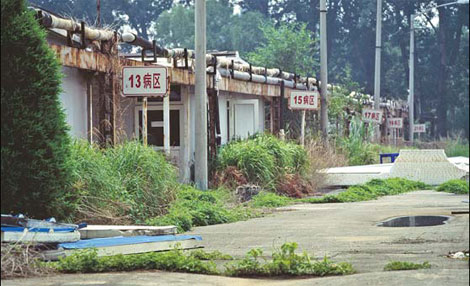Society
Living with SARS
Updated: 2011-03-28 08:02
By Yi Lin (China Daily)
It was another three years before Zhang got a closer look at the disease.
In the spring of 2006, Zhang, now a reporter for March Breeze magazine, run by the China Disabled Person's Federation, found herself at a motivational speech given by Ping Yali, a Paralympic champion, at a sanatorium in suburban Beijing.
"She was addressing a group of SARS survivors, mostly former medical workers infected while at work. It was the first time I had seen a SARS patient in person," Zhang says.
|
Xiaotangshan Hospital, for SARS patients in Beijing, was demolished in 2010. |
A strange feeling came over her.
"There weren't just one or two of them. There were dozens of them, in white striped uniforms and slippers. It felt unreal, like a scene in a movie," she says.
"I wanted to know their stories. After all, they were the heroes who had risked their own health to save others. But how many people still remembered them?"
Zhang never expected that this would be the start of a huge project that would take years to complete.
As Zhang interviewed and took pictures of more than 50 SARS survivors, mostly from Beijing, a horrific tale of their "lucky" escape began to emerge.
"They were decaying physically and falling apart mentally," she says.
Zhang discovered that more than 360 people were living with the devastating after-effects of SARS. The steroids used in their treatment had left them with permanent damage to their bones and lungs.
"They couldn't walk or breathe properly," Zhang says.
They were unable to take care of themselves, and some were forced to go in for joint replacements.
But, based on available technology, these artificial joints can at most be used only for 15 years and are not replaceable. The younger victims are left staring at a bleak future.
Eight years on, while a steely determination to carry on has replaced the earlier anguish, many are grappling with financial difficulties and depression.
Each of the families of those killed by SARS received 5,000 yuan ($760) from the government. Since 2008, the Red Cross Society of China has been trying to organize jobs for the survivors, while also giving 8,000 yuan a year to those who are not fit to be employed.
"In theory, the survivors' work units should pay for the treatment. However, more than 100 of them were unemployed when they caught the disease and social security covered only a part of their treatment costs," Zhang says. Their mental health is another issue as some have had to suffer the trauma of a divorce.
Although at first most of them refused to talk about the past, Zhang's patience eventually won them over and they opened up.
"While they are eager to have their stories known, they are afraid they will face discrimination if their identity as a SARS survivor is revealed," she says.
She recalls how the first survivor she took a picture of, the head nurse at a big Beijing public hospital, called several days after the interview asking Zhang not to go public with her pictures.
Specials

Fill dad's shoes
Daughter and son are beginning to take over the family business of making shoes.

Have you any wool?
The new stars of Chinese animation are edging out old childhood icons like Mickey Mouse and Hello Kitty.

Virtual memorial
High-Tech touches to traditional tombsweeping festival help environment
